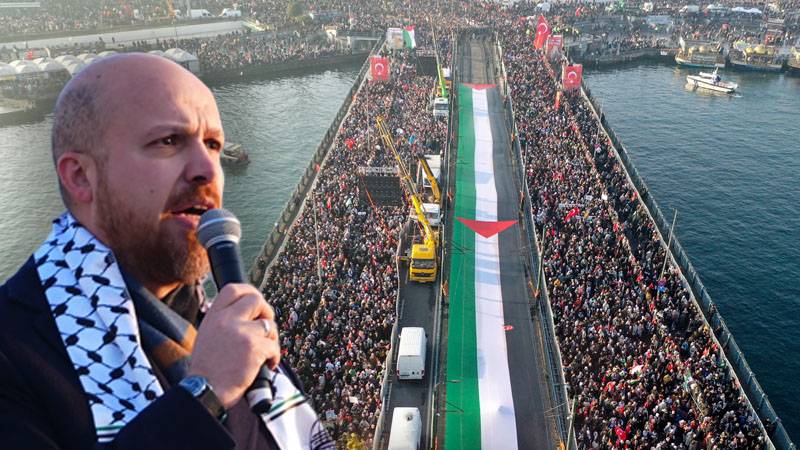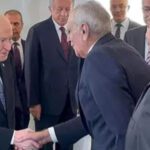Recep Tayyip Erdoğan, Turkey’s long-serving and most divisive political leader, has dominated the country’s political stage for over two decades. As he approaches a point where succession planning becomes essential, signs suggest that his son, Bilal Erdoğan, may be positioned as a key figure in Turkey’s future leadership. Through carefully orchestrated public appearances, strategic messaging, and institutional support, Erdoğan appears to be grooming Bilal for a prominent political role.
Establishing Public Presence Through Strategic Platforms
One of the most apparent ways President Erdoğan prepares Bilal Erdoğan is by providing him with high-profile platforms to address issues that resonate with Turkey’s deeply religious and nationalist base. Events such as the recent “Yesterday Ayasofya, Today Emevi, Tomorrow Aksa” rally in Istanbul have placed Bilal in the public eye, portraying him as a defender of Islamic heritage and a voice for oppressed Muslims worldwide. At such rallies, Bilal Erdoğan has delivered impassioned speeches aligning with his father’s rhetoric, emphasizing Turkey’s leadership in the Islamic world and championing Palestinian and Syrian causes.
By associating Bilal with deeply symbolic themes—such as the reconversion of Ayasofya into a mosque and the broader fight for Islamic unity—Erdoğan ensures his son’s message appeals to the conservative segments of Turkish society. These events also provide Bilal with the opportunity to practice public oratory and leadership skills, essential attributes for any political figure.
Leveraging Institutional Networks
Bilal Erdoğan’s involvement in organizations like the Turkey Youth Foundation (TÜGVA) and the İlim Yayma Vakfı (Foundation for Disseminating Knowledge) highlights another aspect of his preparation. These organizations serve as critical vehicles for fostering grassroots connections and nurturing a loyal support base. TÜGVA, in particular, has strong ties to Turkey’s youth, a demographic that is crucial for sustaining political influence in the long term. Bilal’s leadership roles within these institutions allow him to build networks, influence policy directions, and gain practical experience in organizational management.
Furthermore, these institutions act as conduits for promoting conservative values and bolstering Bilal’s image as a custodian of Erdoğan’s ideological legacy. They also provide a framework for engaging with key segments of Turkish society, including educators, religious leaders, and young professionals, thereby expanding Bilal’s sphere of influence.
Building a Legacy Through Symbolism
Symbolism plays a critical role in Turkish politics, and Recep Tayyip Erdoğan’s ability to weave historical and religious narratives into contemporary politics has been a cornerstone of his success. Bilal Erdoğan is being groomed to inherit this approach, as seen in his speeches and public appearances that draw on Turkey’s Ottoman past and Islamic identity. The emphasis on issues like the liberation of Al-Aqsa Mosque and solidarity with Gaza allows Bilal to align himself with causes that evoke strong emotional and religious sentiments among the electorate.
This symbolic positioning ensures that Bilal is viewed as more than just a political successor; he is framed as a continuation of Erdoğan’s mission to restore Turkey’s regional and global prominence. By associating Bilal with Turkey’s resurgence as a protector of Islamic heritage, Erdoğan crafts a narrative that could resonate deeply with his conservative and nationalist base.
Addressing Potential Criticism
Despite these efforts, the path to preparing Bilal Erdoğan as a successor is not without challenges. Critics view this succession planning as an attempt to establish a political dynasty, a move that could alienate voters who value meritocracy and democratic principles. The association of Bilal with high-profile institutions and events also opens him up to scrutiny, particularly from opposition groups and international observers.
Moreover, Bilal Erdoğan must demonstrate his ability to lead independently of his father’s legacy. While leveraging Erdoğan’s extensive political network provides significant advantages, Bilal will need to develop his own political identity and prove his capability to navigate the complex realities of Turkish politics.
Final thoughts
Recep Tayyip Erdoğan’s preparation of Bilal Erdoğan as his potential successor is a multifaceted strategy rooted in public exposure, institutional engagement, and symbolic positioning. By aligning Bilal with causes and narratives that resonate deeply with Turkey’s conservative electorate, Erdoğan is paving the way for a seamless continuation of his political legacy. However, this strategy also comes with risks, as the perception of dynastic politics and heightened scrutiny could pose significant challenges. As Bilal Erdoğan’s public profile grows, the coming years will reveal whether he can transition from being his father’s protégé to an independent political leader in his own right.
By: News About Turkey (NAT)



